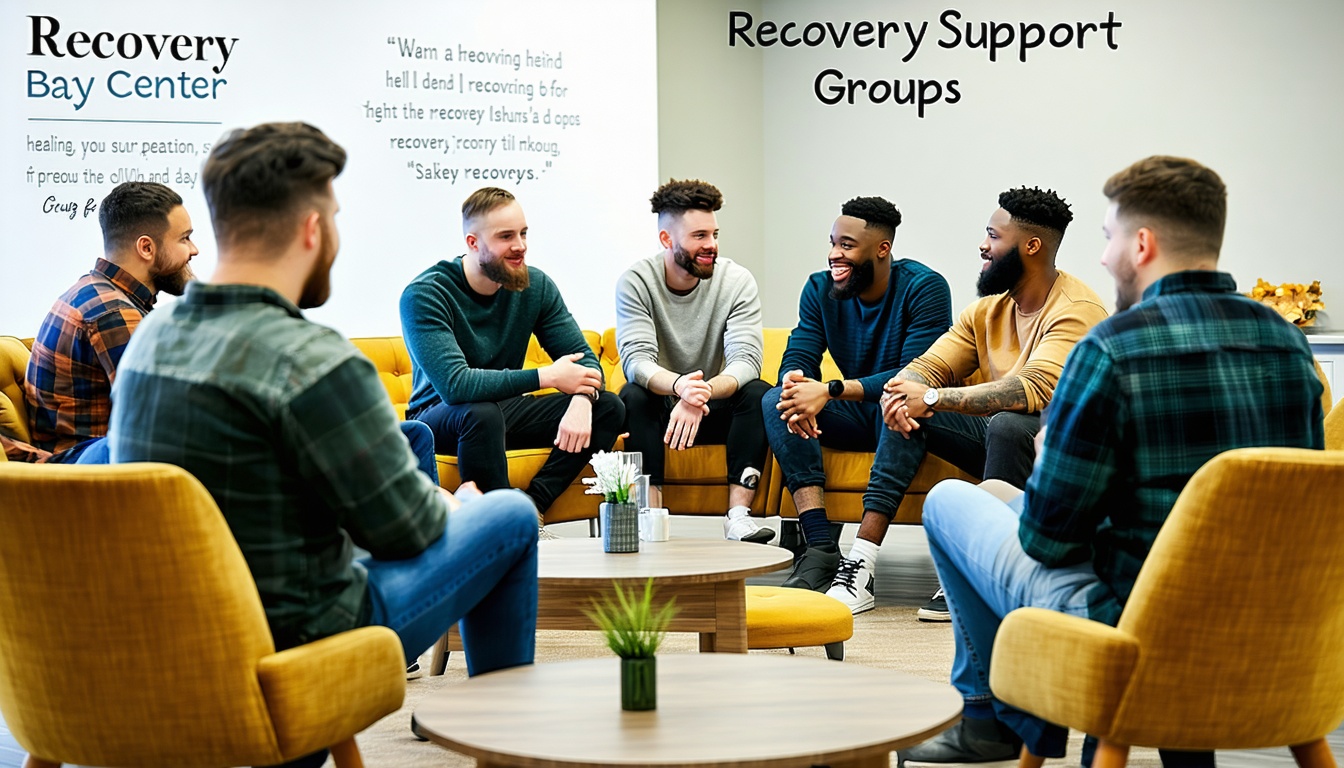Understanding recovery support groups
Recovery support groups play a pivotal role in your wellness journey, providing a sense of optimism and encouragement when you need it most. These groups, which bring together individuals working through similar challenges, have proven effective for many men struggling with drug or alcohol dependence. By sharing experiences, advice, and motivation, members create a supportive environment that can make a significant difference in your daily life. Moreover, these connections help you combat isolation, which often accompanies substance use disorders.
The central idea behind recovery support groups is simple: collective strength in numbers. When you attend meetings, whether in person or online, you can talk openly about your hurdles and successes. Listening to others who face the same obstacles helps you develop empathy, a broader perspective on your own progress, and renewed determination to keep pursuing your goals. In essence, support groups harness the power of community to foster self-awareness and long-term healing.
Recognizing unique challenges in men’s recovery
Many men encounter distinct social expectations that can weigh heavily on their efforts in overcoming addiction. Perhaps you have been conditioned to project strength or emotional resilience, making it difficult to admit vulnerability. These societal pressures can cause you to hide your emotions rather than seek help. Over time, such emotional suppression often intensifies stress and may contribute to substance dependence.
Recovery support groups specifically tailored for men are designed to address those unique challenges. Surrounded by individuals who understand unspoken pressures, you can speak more freely and explore deeper emotional topics. An environment of shared understanding might be exactly what you need to acknowledge underlying issues. That process of acceptance is frequently the first step to designing more effective strategies. Research has shown that men who trust and relate to their fellow group members experience enhanced engagement in treatment and remain committed to sobriety for longer periods.
Exploring different group types
If you are considering recovery support groups, you will discover there is not a one-size-fits-all approach. Several different types of groups exist to cater to varied preferences and personal circumstances. Finding a model that truly resonates with you increases the likelihood of making genuine connections and sustaining your commitment through difficult moments.
-
12-step groups. Typified by Alcoholics Anonymous (AA) and Narcotics Anonymous (NA), the 12-step model focuses on seeking support from peers while integrating spiritual or higher power concepts. According to the Recovery Answers resource, AA alone has an estimated 67,000 groups across the United States and Canada. These gatherings emphasize personal accountability, mutual encouragement, and a well-defined framework for character growth.
-
Non-12-step groups. Programs such as SMART Recovery and Secular Organizations for Sobriety (SOS) take a different approach, often grounded in motivational or cognitive-behavioral techniques. For men who prefer strategies less reliant on faith or spirituality, these groups provide a practical alternative. Topics like problem-solving, coping skills, and creating supportive social networks remain central.
-
Therapeutic and psychoeducational groups. Many structured rehab settings facilitate open conversations about the root causes of dependency, the biological impact of addiction, and mechanisms for positive change. Some gatherings, referred to as behavioral therapy groups, concentrate on identifying triggers and transforming negative thought patterns. Others, known as psychoeducational groups, highlight the science behind substance use and how it affects the brain. Members gain crucial insights into how chemicals and behaviors interact, forming a more profound understanding of recovery.
-
Online support groups. These digital options can be beneficial if you seek more anonymity or face geographical barriers. While they may lack some aspects of face-to-face connection, online groups compensate with accessibility, convenience, and diverse opinions from around the world. Still, it is wise to keep privacy issues in mind and ensure you choose a reputable platform for any online support network.
In many instances, you may find it beneficial to engage in more than one type of recovery group. For example, combining a 12-step organization with a skills-focused group can grant you well-rounded guidance and help you tackle each phase of rehabilitation more effectively.
Integrating group therapy in rehab
Group therapy is a strong ally in addiction recovery, particularly when integrated in a professional rehab center. Research from the NCBI Bookshelf suggests that treating substance use disorders in a group context can create an atmosphere of affiliation, support, and accountability. These qualities, in turn, reinforce commitment to sobriety.
How group therapy works
Under the guidance of trained therapists, groups of 6 to 12 people gather to discuss struggles in a constructive format. Because everyone shares a similar goal—overcoming addiction—you may discover powerful motivation to remain sober and be more open about your challenges. The act of observing others succeed can inspire you to persist on days when you feel vulnerable.
- You bond over shared circumstances, realizing you are not alone.
- You witness real-life examples of recovery, even from severe dependencies.
- You learn practical coping techniques, often recommended by peers who have experienced comparable issues.
Complementing individual treatment
While group therapy is tremendously valuable, it does not entirely replace individual care. Instead, many rehab centers emphasize a well-rounded approach, encouraging participants to supplement group sessions with individual therapy. This dual structure means that while you gain group-based insights into addiction and recovery, you can also privately tackle personal matters like emotional traumas or co-occurring conditions. As research from West LA Recovery points out, this synergy often leads to more thorough treatment outcomes.
Benefits of continued participation
Recovery support groups are not only beneficial during the initial stages of rehabilitation. Long after you leave a structured program, these communities continue to serve as a lifeline. Regular interactions reinforce essential skills you learned in therapy, remind you of the progress you have made, and help you remain accountable to your recovery plan.
Sustained motivation
When life’s daily stresses threaten to derail your journey, a quick check-in with supportive peers can be enough to reset your mindset. Men in recovery often juggle work responsibilities, family expectations, and emotional pressures. In these moments, attending or even leading group sessions can offer a sense of responsibility to collective well-being. You might be inspired to share your experiences and, in turn, validate you are all moving in the right direction.
Emotional connection and shared experiences
Many men appreciate the camaraderie of exchanging stories about real-life triggers or relapse temptations. These honest dialogues maintain motivation and break the silence around addiction. Additionally, support groups frequently organize events or simple social gatherings that encourage healthy connections. This sense of community dissolves isolation, fosters trust, and reminds you that sobriety is both a short-term victory and a lifelong commitment.
Learning new coping mechanisms
As your life circumstances change, you may need to update your coping strategies. Stress at work or evolving social dynamics can lead you to revisit old habits. Group discussions open the door to discovering innovative approaches, whether it is mindfulness routines, more robust boundary-setting methods, or refined communication strategies for handling conflict. You can glean fresh perspectives from individuals who have faced similar obstacles and successfully managed them.
How families benefit from support groups
Those who care about you—close friends, parents, spouses, or siblings—also face challenges in your recovery process. For them, specialized family-focused support groups can prove life-changing. These gatherings address issues such as boundary-setting, emotional support, and the significance of creating a stable environment. Family or loved ones who participate in these groups become better prepared to understand your journey and help you stay on track.
While the main function of your family’s involvement is to strengthen your healing, they also gain insight into their own emotional well-being. Recognizing the emotional burden addiction places on loved ones, many programs encourage participation in dedicated sessions like family therapy. Through these gatherings, everyone has a chance to heal and learn constructive methods of communicating, which can promote a healthier home dynamic.
Why choose Recovery Bay Center for men’s rehab
In your search for a detox and rehabilitation setting that will address your distinct needs, it is important to find a place that not only embraces the power of recovery support groups, but also provides well-rounded care. Recovery Bay Center specializes in men’s drug and alcohol detox, focusing on supportive, community-driven programs that recognize how men’s unique pressures influence treatment needs. This means you can expect:
- Comprehensive care. Recovery Bay Center’s approach includes medical detox supervised by experienced staff, continuous 24/7 nursing attention, and personalized treatment plans that incorporate psychiatric support therapy for co-occurring mental health conditions.
- Tailored treatment programs. Acknowledging men’s shared stressors and life responsibilities, this center offers custom pathways that might include trauma informed therapy, holistic therapy, or specialized experiences like yoga and meditation. By combining group therapy with individual therapy, men can tackle both communal and personal challenges effectively.
- Structured environment. A stable, organized setting helps you focus solely on your recovery. If you are transitioning through detox, it is crucial to have immediate support and accountability, which are integral to forging a healthy routine. Recovery Bay Center’s unwavering attention to every detail, from safe withdrawal procedures to structured outdoor fitness, allows you to focus on sobriety without distractions.
- Peer involvement. One of the most successful strategies for sustained recovery is forging long-term relationships with peers who can relate to your circumstances. At Recovery Bay Center, you will have opportunities to continue connections beyond your residential program through peer support alumni. This alumni network helps you maintain accountability and stay connected to those who have walked a similar path.
By choosing Recovery Bay Center, you will find a specialized men’s rehab that truly understands the broader context of addiction. From the moment you begin medical staff detox to your eventual transition back to everyday life, your well-being is the focus. Whether you need telehealth case management or veterans addiction support, the center’s resources are designed to see you through every stage of the process, ensuring that you receive the support necessary for lasting recovery.
Creating a balanced treatment approach
An effective treatment plan for substance use disorders includes several components that work in synergy. On a practical level, incorporating both professional therapies and peer-led support can accelerate progress. Below are elements you might find beneficial in a balanced approach:
- Therapy mix. Combining group therapy with individual therapy taps into both communal strength and personal reflection. To address deeper concerns, you may explore specialized options like emdr trauma therapy or trauma group therapy.
- Holistic modalities. Physical and mental wellness go hand in hand. Introducing holistic therapy, including yoga and meditation, or programs such as mens holistic wellness, can help you reconnect with yourself and learn mindfulness techniques that mitigate relapse triggers.
- Social and family involvement. Encouraging participation from loved ones through family therapy can foster an environment of understanding. Meanwhile, your peers in peer support alumni groups will reinforce the spirit of community, which can be crucial for men who thrive on the concept of shared accountability.
- Aftercare services. Recovery Bay Center offers follow-up support like sober living referral to ensure you have a stable environment beyond formal treatment. Complementary resources, such as outpatient step down care or alumni program support, help you stay on track as you adjust to daily life without substances.
Each piece of the treatment puzzle has its unique strengths, and combining them can help you sustain recovery across multiple dimensions. Whether you need help deciphering emotional triggers, building healthier relationships, or developing coping strategies for daily stress, a robust support network is often the cornerstone of continued success.
Addressing co-occurring disorders
Men who struggle with addiction frequently find they have underlying mental health conditions, such as depression or anxiety, that complicate recovery. Because of societal expectations, emotional distress sometimes goes unaddressed, which can hinder you from fully engaging in treatment. A comprehensive program—like the one at Recovery Bay Center—will evaluate and address these co-occurring disorders through dual diagnosis therapy. This specialized approach ensures that you receive cohesive care for both substance use disorder and mental health challenges.
Support groups become especially beneficial when dealing with co-occurring conditions. You will meet individuals who can empathize not only with addiction-related experiences but also with depression, anxiety, or trauma. Sharing coping methods, self-care tips, and success stories can lessen feelings of isolation. Furthermore, the network you develop can serve as motivation to seek additional professional guidance, particularly if you experience significant mental health symptoms in the future.
How support groups evolve over time
Your personal growth may lead you to shift through different roles within a recovery community. At first, you may find yourself mostly listening, absorbing advice, and drawing comfort from shared stories. As you gain confidence, you might express your thoughts more openly, become a mentor to newer members, and foster accountability within the group.
Below is a simple table illustrating how your involvement could evolve in a recovery setting:
| Stage of Involvement | Typical Traits | Main Focus |
|---|---|---|
| Newcomer | Quiet, receptive, seeking reassurance | Learning from peers, discovering coping tools |
| Intermediate | Participating actively, sharing struggles | Strengthening coping techniques, building relationships |
| Mentor/Leader | Guiding newcomers, offering insight | Sustaining progress, inspiring others to persist |
This natural progression fosters a deeper sense of connection. Through consistent dialogue, group members motivate one another and reinforce positive behaviors. In such an environment, you might find purpose not just in your personal achievements but also in the success of your peers.
Building confidence and coping mechanisms
Many men report struggling with societal or personal expectations of always being “in control.” Group support allows you to tackle these burdens with courage and vulnerability. By recognizing that your fears, frustrations, and setbacks are understandable, you begin to dismantle negative self-talk. Over time, you learn new ways of handling stress. For instance, if you experience strong cravings after a work-related conflict, you can rely on specialized breathing techniques you learned through a group demonstration.
Recovery support groups also help you identify and plan for triggers. You might observe that certain conflicts, emotional states, or events intensify your urge to use substances. Working through these challenges in a supportive context, you are better prepared to respond calmly, drawing on the collective wisdom of other men who faced similar hardships. If you encounter an unrecognized trigger, the group can help you identify it and refine your strategy.
Emphasizing hope and lasting change
Addiction can lead to feelings of hopelessness, especially if you have faced repeated relapses or setbacks. Recovery support groups, however, show you firsthand that long-term recovery is possible. Hearing personal stories in which individuals overcame extreme loss or chronic struggles reminds you that you are never too far gone. Having a clear illustration of a stable and sober future helps maintain your determination.
Participating in a group-based approach can remind you that healing is not a linear path. Affirmations, celebratory milestones, and open acknowledgment of stumbling blocks all contribute to an atmosphere of empathy. These experiences foster resilience and nudge you toward continuous self-improvement. Your peers understand exactly how challenging small things can seem when you are in active addiction or newly sober, so each collective success, no matter how small, is celebrated. This supportive spirit encourages incremental steps in the right direction.
Frequently asked questions
-
How do I find the right recovery support group for me?
Begin by considering your comfort level with spirituality, therapy approaches, and overall group structure. If you prefer a faith-based format, groups like Alcoholics Anonymous (AA) may be a good fit. If you are looking for an evidence-based model, you might like SMART Recovery. It can be helpful to try a few different meetings to see which group resonates best. -
Are support groups effective if I have not been to rehab yet?
Yes. Attending a recovery support group can be beneficial at any stage. Even before formal rehab, groups provide guidance and structure to help you understand the nature of addiction. That said, professional treatment at a center like Recovery Bay Center can help you address any medical or mental health needs in tandem with peer support. -
What if I am uncomfortable sharing personal details in a group setting?
It is normal to feel apprehensive, especially if you have been taught to guard your emotions. Most recovery groups do not require you to speak until you are ready. Many men find that simply listening at first and seeing others share openly can help lower that initial anxiety. Over time, as you grow more comfortable, speaking up may feel more natural. -
Can I participate in online recovery support groups?
Absolutely. Online groups can offer valuable options if in-person meetings are inaccessible or if you prefer a certain level of anonymity. Various reputable platforms host virtual gatherings, ensuring you can receive encouragement and guidance whenever you need it. Just be mindful of privacy and choose groups moderated or facilitated by credible sources. -
Is family involvement necessary if I am part of a support group?
Family involvement is not mandatory, but it can amplify your chances of a successful recovery. By working together, sharing information, and fostering open communication, everyone can help create a healthier living environment. Many people choose to combine individual or group therapy with family therapy for a holistic approach.
Moving forward with confidence
Whether you are beginning your recovery, exploring new methods to strengthen your existing sobriety, or supporting a loved one, recovery support groups can help pave a more stable and optimistic future. The opportunity to connect with people who have faced similar obstacles provides the reassurance and motivation you need to keep progressing toward long-term wellness.
When combined with a tailored treatment program at a men’s rehab like Recovery Bay Center, the connection you build in these groups blossoms into a vital resource—one that stays with you through every twist and turn of the healing process. You can benefit from dual diagnosis therapy, holistic therapy, or trauma informed therapy to delve more deeply into the triggers behind your substance use. Meanwhile, group interaction offers real-time support, accountability, and social reinforcement.
In the end, your journey can be strengthened by a variety of tools—from personalized therapies to strong communal bonds. By choosing to engage in recovery support groups and seeking specialized men’s rehab services at Recovery Bay Center, you position yourself to rediscover hope and embrace long-term healing. As you continue to learn, evolve, and connect, you equip yourself with the support necessary for lasting recovery. And with each step forward, you reaffirm that transformative change is achievable—and well within your reach.





